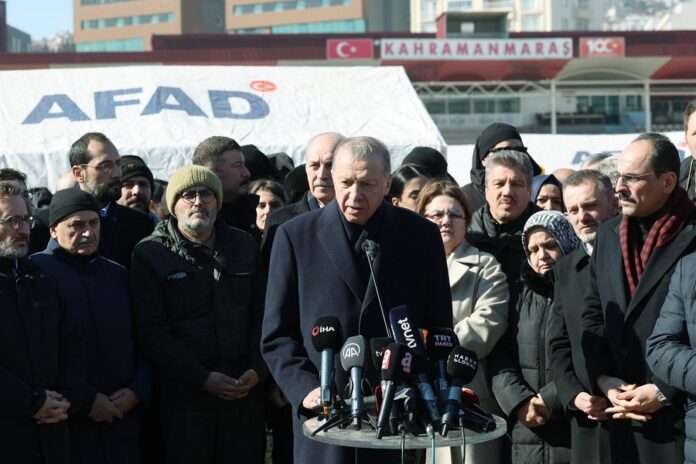President Tayyip Erdogan on Wednesday admitted there were problems with his government’s initial response to a devastating earthquake in southern Turkey amid anger from those left destitute and frustrated over the slow arrival of rescue teams, according to Reuters.
Erdogan, who contests an election in May, said on a visit to the disaster zone that operations were now working normally and promised no one would be left homeless, as the combined death toll across Turkey and neighbouring Syria climbed above 11,500.
Across a swathe of southern Turkey, people sought temporary shelter and food in freezing winter weather, and waited in anguish by piles of rubble where family and friends might still lie buried.
Rescuers were still digging out some people alive, and finding others dead. But many Turks have complained of a lack of equipment, expertise and support to rescue those trapped – sometimes even as they could hear cries for help.
“Where is the state? Where have they been for two days? We are begging them. Let us do it, we can get them out,” Sabiha Alinak said near a snow-covered collapsed building where her young relatives were trapped in the city of Malatya.
There were similar scenes and complaints in neighbouring Syria, whose north was also hard hit by Monday’s huge quake.
Syria’s ambassador to the United Nations admitted the government had a “lack of capabilities and lack of equipment” but blamed this on over a decade of civil war in his country and Western sanctions.
The death toll from both countries was expected to rise further as hundreds of collapsed buildings in many cities have become tombs for people who had been asleep in the homes when the quake hit in the early morning.
Many in the disaster zone had slept in their cars or in the streets under blankets, fearful of going back into buildings shaken by the 7.8 magnitude tremor – Turkey’s deadliest since 1999 – and by a second powerful quake hours later.
The reported death toll rose to 9,057 in Turkey on Wednesday. In war-wrecked Syria, the confirmed toll climbed to more than 2,500 overnight, according to the government and a rescue service operating in the rebel-held northwest.
Turkish officials say some 13.5 million people were affected in an area spanning roughly 450 km (280 miles) from Adana in the west to Diyarbakir in the east. In Syria, it killed people as far south as Hama, 250 km from the epicentre.
More than 298,000 people have been made homeless and 180 shelters for the displaced had been opened, Syrian state media reported, apparently referring to areas under government control, not those held by other factions.
Erdogan, who has declared a state of emergency in 10 provinces and sent in troops to help, arrived in Kahramanmaras to view the damage and see the rescue and relief effort.
Speaking to reporters, with the wail of ambulance sirens in the background, Erdogan said there had been problems with roads and airports but “we are better today”.
“We will be better tomorrow and later. We still have some issues with fuel … but we will overcome those too,” he said.
Later, he condemned criticism of the government’s response. “This is a time for unity, solidarity. In a period like this, I cannot stomach people conducting negative campaigns for political interest,” Erdogan told reporters on his arrival in the southern province of Hatay.
Nevertheless, the disaster will pose a challenge to Erdogan in the May election that was already set to be the toughest fight of his two decades in power.


